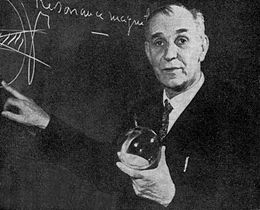Alfred Kastler
Alfred Kastler | |
|---|---|
Claude Cohen Tannoudji |
Alfred Kastler (French:
Biography
Kastler was born in
Collaborating with
He won the Nobel Prize in Physics in 1966 "for the discovery and development of optical methods for studying Hertzian resonances in atoms".
He was president of the board of the Institut d'optique théorique et appliquée and served as the first chairman of the non-governmental organization (NGO) Action Against Hunger.
Kastler also wrote poetry (in German). In 1971 he published Europe, ma patrie: Deutsche Lieder eines französischen Europäers (i.e. Europe, my fatherland: German songs of a French European).
In 1976, Kastler was elected to the American Philosophical Society.[3]
In 1978 he became foreign member of the Royal Netherlands Academy of Arts and Sciences.[4]
In 1979, Kastler was awarded the Wilhelm Exner Medal.[5]
Laboratoire Kastler-Brossel

Professor Kastler spent most of his research career at the Ecole Normale Supérieure in Paris where he started after the war with his student, Jean Brossel a small research group on spectroscopy.
Over the forty years that followed, this group has trained many of young physicists and had a significant impact on the development of the science of
Global policy
He was one of the signatories of the agreement to convene a convention for drafting a
Death
Professor Kastler died on 7 January 1984, in Bandol, France.[9]
See also
Notes
- ^ At the time, the ENS was part of the University of Paris according to the decree of 10 November 1903.
- ]
- ^ "APS Member History". search.amphilsoc.org. Retrieved 2022-07-25.
- ^ "A.H.F. Kastler (1902 - 1984)". Royal Netherlands Academy of Arts and Sciences. Retrieved 19 July 2015.
- ^ Editor, ÖGV. (2015). Wilhelm Exner Medal. Austrian Trade Association. ÖGV. Austria.
- ^ "Letters from Thane Read asking Helen Keller to sign the World Constitution for world peace. 1961". Helen Keller Archive. American Foundation for the Blind. Retrieved 2023-07-01.
- ^ "Letter from World Constitution Coordinating Committee to Helen, enclosing current materials". Helen Keller Archive. American Foundation for the Blind. Retrieved 2023-07-03.
- ^ "Preparing earth constitution | Global Strategies & Solutions | The Encyclopedia of World Problems". The Encyclopedia of World Problems | Union of International Associations (UIA). Retrieved 2023-07-15.
- ^ Sullivan, Walter (8 January 1984). "Dr. Alfred Kastler, 81, Nobel Prize-Winner, Dies". The New York Times. Retrieved 2010-11-06.
References
- Nobelstiftelsen (1972). Nobel Lectures, Physics 1963–1970. Amsterdam: Elsevier Publishing Company. ISBN 0-444-40993-9.
- Kastler A (October 1967). "Optical Methods for Studying Hertzian Resonances". Science. 158 (3798): 214–221. PMID 17839496.
- Kastler A (July 1950). "Applications of polarimetry to infra-red and micro-wave spectroscopy". Nature. 166 (4211): 113. S2CID 4192600.
External links
- Alfred Kastler on Nobelprize.org including the Nobel Lecture, December 12, 1966 Optical Methods for Studying Hertzian Resonances
- Alfred Kastler biography at Timeline of Nobel Winners
- Alfred Kastler at the Mathematics Genealogy Project
